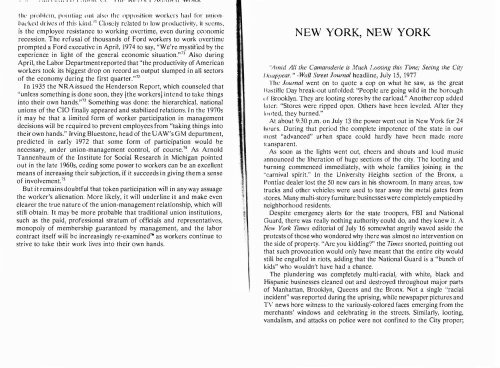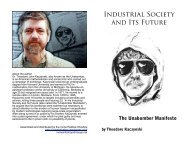CONTENTS - ouroboros ponderosa
CONTENTS - ouroboros ponderosa
CONTENTS - ouroboros ponderosa
You also want an ePaper? Increase the reach of your titles
YUMPU automatically turns print PDFs into web optimized ePapers that Google loves.
. " . . ,,, t, , , , ,, , I ' 0 , ; "" '.\ \ , _ 1 1 11' "1" ' 1 11 , 1 I \I .;\ I I'I''' J Wt lHI\.<br />
lilt, IHDhlclll. PPilltil1g uut also the t lpptlsitioll workers had fo r union· <br />
baL'ked drives of this kind .'11 Closdy rdated til low productivity, it seems.<br />
is the employee resistance to working overtime, even during economic<br />
recession. The refusal of thousands of Ford workers to work overtime<br />
prompted a Ford executive in April, 1974 to say, "We're mystitied by the<br />
experience in light of the general economic situation."71 Also during<br />
April, the Labor Department reported that "the productivity of American<br />
workers took its biggest drop on record as output slumped in all sectors<br />
of the economy during the first quarter."n<br />
In 1935 the NRA issued the Henderson Report, which counseled that<br />
"unless something is done soon, they [the workers 1 intend to take things<br />
into their own hands."" Something was done: the hierarchical, national<br />
unions of the CIO finally appeared and stabilized relations. In the 1970s<br />
it may be that a limited form of worker participation in management<br />
decisions will be required to prevent employees from "taking things into<br />
their own hands." Irving Bluestone, head of the UA W's GM department,<br />
predicted in early 1972 that some form of participation would be<br />
necessary, under union-management control, of course." As Arnold<br />
Tannenbaum of the Institute for Social Research in Michigan pointed<br />
out in the late 19605, ceding some power to workers can be an excellent<br />
means of increasing their subjection, if it succeeds in giving them a sense<br />
of involvement."<br />
But it remains doubtful that token participation will in any way assuage<br />
the worker's alienation. More likely, it will underline it and make even<br />
clearer the true nature of the union-management relationship, which will<br />
still obtain. It may be more probable that traditional union institutions,<br />
such as the paid, professional stratum of offici als and representatives,<br />
monopoly of membership guaranteed by management, and the labor<br />
contract itself will be increasingly re-examined'6 as workers continue to<br />
strive to take their work lives into their own hands.<br />
NEW YORK, NEW YORK<br />
"l1rnid All the Camaraderie is Much I,ooling this Time; Seeing the City<br />
/ll.mppcar. " -Wall Street Journal headline, July 1 5, 1977<br />
Tht: Journal went on to quote a cop on what he saw, as the great<br />
Ilastille Day break-out unfolded: "People are going wild in the borough<br />
" f Brooklyn. They are looting stores by the carload." Another cop added<br />
later: "Stores were ripped open. Others have been leveled. After they<br />
looted, they burned."<br />
At about 9:30 p.m. on July 13 the power went out in New York for 24<br />
hours. During that period the complete impotencc of the state in our<br />
most "advanced" urban space could hardly have been made more<br />
transparent.<br />
As soon as the lights went out, cheers and shouts and loud music<br />
announced the liberation of huge sections of the city. The looting and<br />
hurning commenced immediately, with whole families joining in the<br />
"carnival spirit." In the University Heights section of the Bronx, a<br />
Pontiac dealer lost the 50 new cars in his showroom. In many areas, tow<br />
trucks and other vehicles were used to tear away the metal gates from<br />
stores. Many multi-story furniture businesses were completely emptied by<br />
neighborhood residents.<br />
Despite emergency alerts for the state troopers, FBI and National<br />
Guard, there was really nothing authority could do, and they knew it. A<br />
New York Times editorial of July 16 somewhat angrily waved aside the<br />
protests of those who wondered why there was almost no intervention on<br />
the side of property. "Are you kidding?" the Times snorted, pomtmg out<br />
that such provocation would only have meant that the entire city would<br />
still be engulfed in riots, adding that the National Guard is a "bunch of<br />
kids" who wouldn't have had a chance.<br />
The plundering was completely multi-racial, with white, black and<br />
Hispanic businesses cleaned out and destroyed throughout major parts<br />
of Manhattan, Brooklyn, Queens and the Bronx. Not a single "racial<br />
incident" was reported during the uprising, while newspaper pictures and<br />
TV news bore witness to the variously-colored faces emerging from the<br />
merchants' windows and celebrating in the streets. Similarly, looting,<br />
vandalism, and attacks on police were not confined to the City proper;






